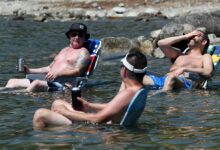Wet January for B.C.’s South Coast results in local states of emergency, flooding and road closures
Parts of B.C.’s South Coast are still recovering from 28 days of rain in January, with several major roads still closed and at least two areas under a state of emergency.
Hundreds of people remain stranded in the Fraser Valley after a mudslide blocked one kilometre of Hemlock Valley Road near the Sasquatch Mountain ski hill.
A sustained storm, lasting 36-hours in some areas, hit the province Friday. Environment Canada said it was one of the wettest Januarys on record, dating back to the 1930s.
By the time the skies cleared, up to 371 millimetres of rain came down in some of the worst hit parts of western Vancouver Island. Other areas, including Metro Vancouver and the Fraser Valley, received between 50 to 100 millimetres.
“This is not the typical, run-of-the-mill, autumn or winter storm,” said Philippe-Alain Bergeron, a meteorologist with Environment and Climate Change Canada.
The intensity and sustained rainfall, combined with a month of near-record breaking rain, caused flooding and other problems like mud and landslides.
“It’s just been a very wet month, so we already had a lot of moisture and saturated ground,” he said.
“If you add heavy rain on top of that, it can be a recipe for disaster.”
Crews spent much of Saturday responding to emergencies and power outages caused by the weather.
On Sunday, problems remained, including reduced phone service for some customers after there was damage to lines.
Skiers still stuck on hill
It could be five or six days before work crews can build a road allowing access in and out of Hemlock Valley and the Sasquatch Mountain ski resort, near Agassiz.
The resort’s Shelby Lim said that over the weekend as many as 500 people were forced to stay either in the community or at the resort.
The road washed away Friday night amid heavy rain and the Ministry of Transportation says there is no safe detour around the damaged road.
The ministry is advising those who are behind the washout to stay where they are for the time being, although the resort says a local helicopter company is offering a lift out for a $150 fee. So far around 100 people have left.
The District of Kent declared a state of emergency to help deal with conditions in the Agassiz area. Photos posted online by the Ministry of Transportation show one local road, Rockwell Drive, near Harrison Hot Springs, washed out.
Kent Mayor Sylvia Pranger says about 40 homes were evacuated north of Harrison Hot Springs when Rockwell Drive washed away.
Rising water prompted the Cowichan Valley Regional District on Vancouver Island to also declare a local state of emergency and move more than two dozen residents out of their homes.
The district says some residents along the highway where flooding was the worst were getting help sandbagging their properties.
Other road closures
One of B.C.’s U.S. border crossings was closed due to flooding in Abbotsford. Drive BC said Highway 11 was closed southbound, resulting in the closure of the Sumas border crossing.
Snow problems, too
As much as 80 centimetres of snow has fallen on B.C.’s southern interior mountains in the last few days, creating worrisome avalanche conditions.
Avalanche Canada says the danger level has decreased in most areas from extreme to high or considerable.
The forecaster says strong winds through Glacier National Park could destabilize the upper snowpack, while elsewhere it expects natural avalanches to occur because of the added snowfall.
While the danger rating is expected to drop Sunday, Avalanche Canada still warns those in the backcountry to exercise caution in choosing a route, especially when there is avalanche terrain up above.
CBC








Redes Sociais - Comentários